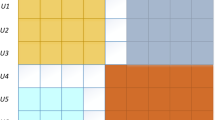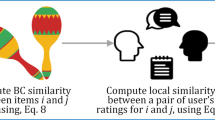Abstract
While Spread Activation has shown its effectiveness in solving the problem of cold start and sparsity in collaborative recommendation, it will suffer a decay of performance (over activation) as the dataset grows denser. In this paper, we first introduce the concepts of Rating Similarity Matrix (RSM) and Rating Similarity Aggregation (RSA), based on which we then extend the existing spreading activation scheme to deal with both the binary (transaction) and the numeric ratings. After that, an iterative algorithm is proposed to learn RSM parameters from the observed ratings, which makes it automatically adaptive to the user similarity shown through their ratings on different items. Thus the similarity calculations tend to be more reasonable and effective. Finally, we test our method on the EachMovie dataset, the most typical benchmark for collaborative recommendation and show that our method succeeds in relieving the effect of over activation and outperforms the existing algorithms on both the sparse and dense dataset.
Preview
Unable to display preview. Download preview PDF.
Similar content being viewed by others
References
Amazon homepage. In, http://www.amazon.com
Breese, J., Heckerman, D., Kadie., C.: Empirical analysis of predictive algorithms for collaborative filtering. In: Proceedings of 14th Conference on Uncertainty in Artificial Intelligence, pp. 43–52 (1998)
Chen, H.: An algorithmic approach to concept exploration in a large knowledge network: Symbolic branch-and-bound search vs. connectionist hopeld net activa- tion. Journal of the American Society for Information Science and Technology 46(5), 348–369 (1995)
Collins, A.M., Loftus, E.F.: A spreading activation theory of semantic processing. Psychology Review 82(6), 407–428 (1975)
Golbeck, J., Parsia, B., Hendler, J.: Trust networks on the semantic web. Proceedings of Cooperative Intelligent Agents 2003 (2003)
Herlocker, J.L., Konstan, J.A., Borchers, A., Riedl, J.: An algorithmic framework for performing collaborative filtering. In: Proceedings of the 22nd annual international ACM SIGIR conference on Research and development in information retrieval, pp. 230–237 (1999)
Huang, Z., Chen, H.C., Zeng, D.: Applying associative retrieval techniques to alleviate the sparsity problem in collaborative filtering. ACM Transactions on Information Systems 22(1), 116–142 (2004)
Nathaniel, G., Schafer, J.B., Konstan, J.A.: Combining collaborative ltering with personal agents for better recommendations. In: Proceedings of the 1999 Conference of the American Association of Articial Intelligence, pp. 439–446 (1999)
Paul, M., John, D.: Each to each programmer’s reference manual. In: HP Labs Technical Reports, SRC-TN-1997-023 (1997)
Massa, P., Bhattacharjee, B.: Using trust in recommender systems: an experimental analysis. In: Proceeding of the iTrust2004 International Conference (2004)
Resnick, P., Iacovou, N., Suchak, M., Bergstrom, P., Riedl, J.: Grouplens: An open architecture for collaborative filtering of netnews. In: Proceedings of the 1994 ACM Conference on Computer Supported Cooperative Work, pp. 175–186 (1994)
Yu, K., Schwaighofer, A., Tresp, V., Xu, X.: Probabilistic memory-based collaborative filtering. IEEE Transaction on Knowledge and Data Engineering 16(1), 56–69 (2003)
Author information
Authors and Affiliations
Editor information
Editors and Affiliations
Rights and permissions
Copyright information
© 2005 Springer-Verlag Berlin Heidelberg
About this paper
Cite this paper
Han, P., Xie, B., Yang, F., Shen, RM. (2005). An Adaptive Spreading Activation Scheme for Performing More Effective Collaborative Recommendation. In: Andersen, K.V., Debenham, J., Wagner, R. (eds) Database and Expert Systems Applications. DEXA 2005. Lecture Notes in Computer Science, vol 3588. Springer, Berlin, Heidelberg. https://doi.org/10.1007/11546924_10
Download citation
DOI: https://doi.org/10.1007/11546924_10
Publisher Name: Springer, Berlin, Heidelberg
Print ISBN: 978-3-540-28566-3
Online ISBN: 978-3-540-31729-6
eBook Packages: Computer ScienceComputer Science (R0)




